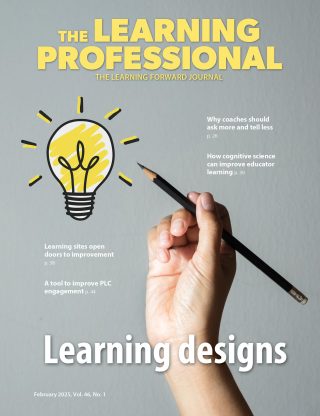RESEARCH
Research Review
Critical questions remain unanswered in research on teacher leadership
By Joellen Killion
August 2017
Vol. 38 No. 4
Read the remaining content with membership access. Join or log in below to continue.
Sed ut perspiciatis unde omnis iste natus error sit voluptatem accusantium doloremque laudantium, totam rem aperiam, eaque ipsa quae ab illo inventore veritatis et quasi architecto beatae vitae dicta sunt explicabo. Nemo enim ipsam voluptatem quia voluptas sit aspernatur aut odit aut fugit, sed quia consequuntur magni dolores eos qui ratione voluptatem sequi nesciunt. Neque porro quisquam est, qui dolorem ipsum quia dolor sit amet, consectetur, adipisci velit, sed quia non numquam eius modi tempora incidunt ut labore et dolore magnam aliquam quaerat voluptatem.
WHAT THIS MEANS FOR PRACTITIONERS
This review of research on teacher leadership may seem disappointing, yet rather than emphasize what the research fails to support, it identifies the areas that require careful attention from practitioners and researchers.
Practitioners who want to elevate the significance and visibility of their teacher leadership efforts have a responsibility for clearly defining teacher leadership, establishing its purpose and theoretical framework, creating the conditions and structures that support it (see A Systemic Approach to Elevating Teacher Leadership, Killion et al., 2016), preparing and supporting teacher leaders, and evaluating the effects of teacher leadership on teacher leaders, their colleagues, their school, school system, and communities, and their students.
In addition, since the most common role of teacher leaders is supporting the professional learning of their colleagues, it is imperative that teacher leaders understand and apply the Standards for Professional Learning (Learning Forward, 2011) within their practice and for designing, implementing, and evaluating the professional learning that occurs within school.
This study also calls for thoughtful consideration of the preparation and continuous professional learning of teacher leaders as well as for engaging underrepresented teachers in leadership roles. All efforts to engage, prepare, and support teacher leaders and those who are responsible for supporting and supervising them are other opportunities for applying the Standards for Professional Learning.
References
Killion, J., Harrison, C., Colton, A., Bryan, C., Delehant, A., & Cooke, D. (2016). A systemic approach to elevating teacher leadership. Oxford, OH: Learning Forward. Available at www.learningforward.org/docs/default-source/pdf/a-systemic-approach-to-elevating-teacher-leadership.pdf.
Learning Forward. (2011). Standards for Professional Learning. Oxford, OH: Author.
York-Barr, J. & Duke, K. (2004). What do we know about teacher leadership? Findings from two decades of scholarship. Review of Educational Research, 74(3), 255-316.

Joellen Killion is a senior advisor to Learning Forward and a sought-after speaker and facilitator who is an expert in linking professional learning and student learning. She has extensive experience in planning, design, implementation, and evaluation of high-quality, standards-based professional learning at the school, system, and state/provincial levels. She is the author of many books including Assessing Impact, Coaching Matters, Taking the Lead, and The Feedback Process. Her latest evaluation articles for The Learning Professional are “7 reasons to evaluate professional learning” and “Is your professional learning working? 8 steps to find out.”
Recent Issues
BUILDING BRIDGES
December 2024
Students benefit when educators bridge the continuum of professional...
CURRICULUM-BASED PROFESSIONAL LEARNING
October 2024
High-quality curriculum requires skilled educators to put it into...
LEARNING TO PIVOT
August 2024
Sometimes new information and situations call for major change. This issue...
GLOBAL PERSPECTIVES
June 2024
What does professional learning look like around the world? This issue...












